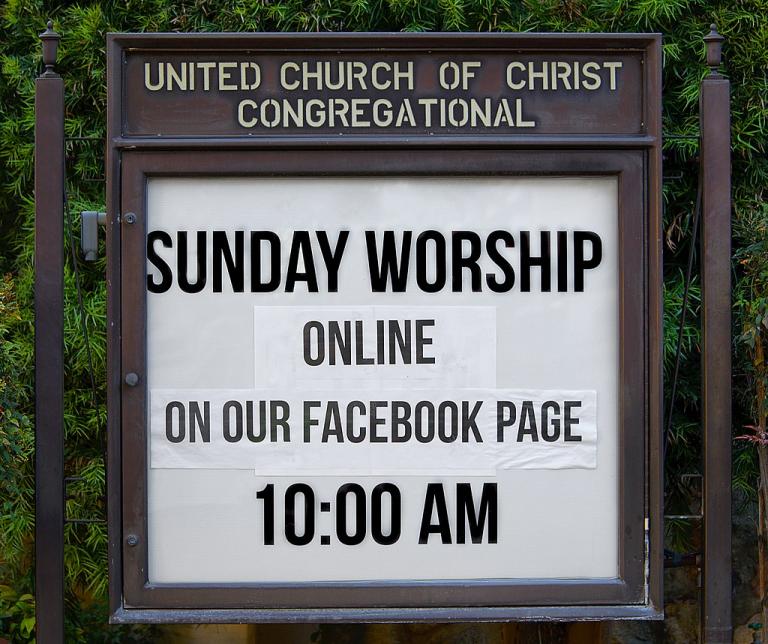In perhaps the most extraordinary state action in the COVID-19 lockdown, churches were not allowed to hold in-person services. So they took advantage of today’s technology and began streaming services, so that worshippers could participate online via Facebook, YouTube, or the church’s website.
By now, the restrictions are mostly over, and the majority of churches are meeting in person as usual. But many of them are still streaming their services. Before, the online services consisted largely of the pastor addressing a camera, with participants at home following along with their hymnbooks. Now congregations are streaming their in-person services, showing not just the pastor but the rest of the congregation with audio of the music. The online services are thought to be a good means of outreach and a way for shut ins and other members who have to be absent to participate in worship.
In an article entitled Why Churches Should Drop Their Online Services, published in the New York Times, no less, Tish Harrison Warren, a priest in the Anglican Church of North America, argues that congregations should stop doing that. She gives four reasons:
(1) We are bodies and worship should engage all our senses;
(2) The risk of being separated from others is greater than the risk of COVID, at least now;
(3) We need embodied community;
(4) Gathering in person forces us to deal with people who are different from ourselves.
Now a Missouri Synod Lutheran pastor, David Kummer, has written a rebuttal to that position, posted by the Acton Institute, Reply to The New York Times: Online worship is still worship.
He begins by agreeing with those four points.
What must be realized about online worship, however, is that it is additive in its congregational function. It does not replace in-person worship. It provides an option for people to engage with their community when they cannot be physically present within it—whether they’re sick at home, on vacation, or, yes, whether they drank a bit too much the night before. The church at her best has never been in the game to force someone’s hand. Rather, because Jesus disperses his gifts abundantly and graciously, we’re given the blessing of doing the same. It is his church, and we’re in no position to withhold the gifts he gives for everyone.
He then defends online worship in terms of the Lutheran theology of worship:
Because I’m a Lutheran Christian, I believe worship is first and foremost an act of God, hence the liturgies for Holy Communion in our hymnal are entitled Divine Services: God comes to serve his people through his means of grace, declaring them forgiven by the power of his Word!
For those who know anything about Lutheranism, one might be surprised that I don’t agree with Ms. Warren. After all, Lutheranism confessed in the 16th century and still does that in the Lord’s Supper and in Holy Baptism, God conveys and delivers His forgiveness through means—something tangible in person. In the case of the Lord’s Supper, Jesus gives us his body and blood through the bread and wine for the forgiveness of sins. Similarly, in Holy Baptism the Word-drenched water buries all original sin, and sins, in the tomb of Christ. In absolution, the embodied pastor forgives God’s people in the stead and by the command of Christ. For Martin Luther and those after him, the means of grace were central to how God acts in our life: They are tangible elements bringing God and his hard-earned, gracious love right before our eyes.
So, because worship is first and foremost about God coming to us through his Word, where a person receives that Word is not essential; the Word does not lose its power in its transmission through airwaves or electrons.
Rev. Kummer says that streaming services “is not anti-sacramental.” This is because the Word operates sacramentally. The Lord’s Supper is indeed important, but he communes the congregation’s shut-ins when he visits them. In the meantime, even though they cannot leave their homes, they are able to feel connected with their congregation, participating in its liturgical life and being built up by God’s Word.
“Online services overcome the barrier of distance and offer fellowship of a kind,” says Rev. Kummer, “one not defined by proximity but by confession of faith, which is the core of fellowship.”
Two other perspectives to consider:
(1) Trevin Wax warns that ‘Gotcha’ Sermon Clips Are Bad for the Church. Now that pastors’ sermons are generally available online, some people are taking the opportunity to vilify pastors for what they say, often editing out clips and taking them out of context in order to tear down their ministry. Rev. Wax points out that a sermon is an intimate address from the pastor to his flock, and is not always appropriate for outsiders.
Then again, I would add, sermons can also be proclamations of the Gospel to outsiders, and they would do well to be careful about what they say even to their members. The social media rule holds true even for sermons: Don’t say anything on the internet that you don’t want the world to know. And yet if you preach with this mindset, you risk censoring yourself.
(2) Another Missouri Synod pastor and media expert A. Trevor Sutton agrees that online worship can be legitimate. But in his essay Bringing Common Sense to the Online-Worship Debate, he explains how digital media throws off the unity of the senses that is critical both to worship and to human life.
I co-wrote Authentic Christianity with Trevor, who is also the author of a new book on Christianity and digital media entitled Redeeming Technology .
So here are my questions: What do YOU think? Is your church still streaming your services or has it stopped doing so? Why? What has been your congregation’s experience with all of this?
Image by Russ Allison Loar, CC BY-SA 4.0 <https://creativecommons.org/licenses/by-sa/4.0>, via Wikimedia Commons













